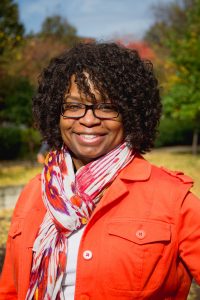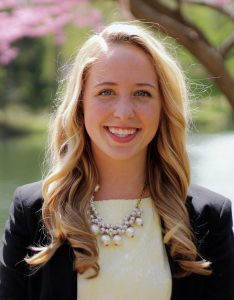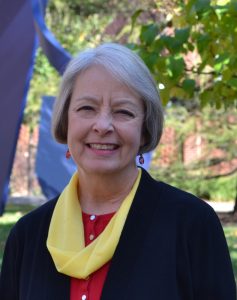The 2018 Women Impacting ISU calendar will include three women from the College of Engineering:
- LeQuetia Ancar, assistant director of engineering student services
- Rachael Barnes, senior in biological systems engineering
- Judy Vance, professor of mechanical engineering
The Women Impacting ISU calendar began in 2007 with a mission to “recognize and pay tribute to students, faculty and staff who have distinguished themselves through leadership and positive differences made at Iowa State.” The calendar is organized by Iowa State’s Carrie Chapman Catt Center for Women and Politics and funded by the Office of the Vice President for Diversity and Inclusion.
Ancar, Barnes and Vance were chosen by a selection committee based on nominations by people who have witnessed “outstanding accomplishments and positive impact” that honorees have made at Iowa State.
On Jan. 10 at 3:30 p.m., an unveiling reception will be held in the Sun Room of the Memorial Union to honor this year’s calendar women.
Fostering Inclusion
 LeQuetia Ancar, assistant director of engineering student services and the college’s multicultural liaison, is a champion for inclusion with a track record of creating successful programs to promote student retention and success.
LeQuetia Ancar, assistant director of engineering student services and the college’s multicultural liaison, is a champion for inclusion with a track record of creating successful programs to promote student retention and success.
“LeQuetia strives every day to create an inclusive and supportive learning community within our college, while providing academic and professional development resources for our engineering students,” said Joel Johnson, director of engineering student services.
One example of Ancar’s advocacy for student success is illustrated in a recent campus climate survey for engineering undergraduate students. Ancar was key in demonstrating the value of the survey – and in implementing changes to student services offerings based on the survey findings.
Ancar, a graduate of Iowa State with a master’s degree in industrial education and technology and a Ph.D. in industrial and agricultural technology, has been with the College of Engineering Student Services since 2010.
“LeQuetia is a great role model to our students – completing a doctorate, having a successful and impactful career in an academic institution and practicing work-life balance,” said Sriram Sundararajan, associate dean for academic affairs.
Those who work with Ancar say there is no doubt she is creating a lasting impact on Iowa State.
“LeQuetia’s commitment to students and their success within our college has positively affected significant numbers of engineering students. She gives, selflessly, her time to be available to students,” Johnson said.
Facing Political Adversity, Advancing Undergrad Women
 Rachael Barnes is a passionate student leader who has made significant contributions to advancing women undergraduates on campus.
Rachael Barnes is a passionate student leader who has made significant contributions to advancing women undergraduates on campus.
She has been active in Women in Science and Engineering (WiSE) since 2014, moving quickly into leadership roles.
“Rachael’s passion to serve students has helped WiSE engage first-year students beyond learning communities by developing them as leaders from their first day on campus,” said Lora Leigh Chrystal, director of WiSE.
In 2017, Barnes ran for Student Government vice president, motivated by the lack of representation of undergrad women in leadership roles at Iowa State. Barnes now serves as the senior director of student services for the Student Government.
“Throughout the campaign, Rachael was the target of sexism, which perhaps would have caused other candidates to quit. But each time she was criticized for her gender, treated unfairly or faced a challenge, Rachael demonstrated grace and composure,” Chrystal said.
Barnes also excels in the classroom, where she a senior in biological systems engineering and global resource systems, seeking out many opportunities for experiential learning in world food issues. Barnes has been an undergrad research assistant, she completed an international global resource internship in Uganda, and a summer internship with Missman Inc. in Rock Island, Illinois. Barnes recently took home best poster prize at the 2017 Norman Borlaug Lecture, held in conjunction with the World Food Prize celebration.
Forging a Lasting Impact
 Judy Vance, Joseph C. and Elizabeth A. Anderlik Professor of Engineering, is a pioneer in her field who has inspired both students and colleagues during her career.
Judy Vance, Joseph C. and Elizabeth A. Anderlik Professor of Engineering, is a pioneer in her field who has inspired both students and colleagues during her career.
Vance was the first female tenure-track faculty member in Iowa State’s Department of Mechanical Engineering when she joined in 1992, and she was the first woman to chair an Iowa State engineering department (2003-2006).
“Judy’s impact on the Iowa State campus has spanned five decades, and she has influenced countless students and colleagues during that time,” said Caroline Hayes, chair of mechanical engineering and Lynn Gleason Professor of Interdisciplinary Engineering.
Vance obtained her bachelor’s, master’s and Ph.D. degrees in mechanical engineering from Iowa State University. In addition to her industrial experience at John Deere and academic career at Iowa State, Vance has also served as a National Science Foundation program director and has been a key member of several NSF advisory committees.
Vance’s leadership of the Women in Engineering Leadership Institute (WELI) has influenced women engineering faculty across the United States to enter into academic leadership roles, especially as department chairs. Locally, she was one of a handful of women who worked to reactivate the dormant Society of Women Engineers Heart of Iowa professional section. She also served several years as Iowa State’s SWE counselor and later as faculty advisor. Vance and her students volunteered to present research opportunities in virtual reality at the Road Less Traveled Conference many times, exposing young women to exciting opportunities in engineering as a career.
“Judy has inspired many to pursue their goals and achieve success, not only in the classroom, but through their research and other endeavors, as well,” said Gül Kremer, C.G. “Turk” and Joyce A. Therkildsen Department Chair in Industrial and Manufacturing Systems Engineering. “I have always observed Judy to be a role model, not only as a woman in engineering who climbed the academic ladder, but also as a genuinely good person who worked to support development of women leaders.”